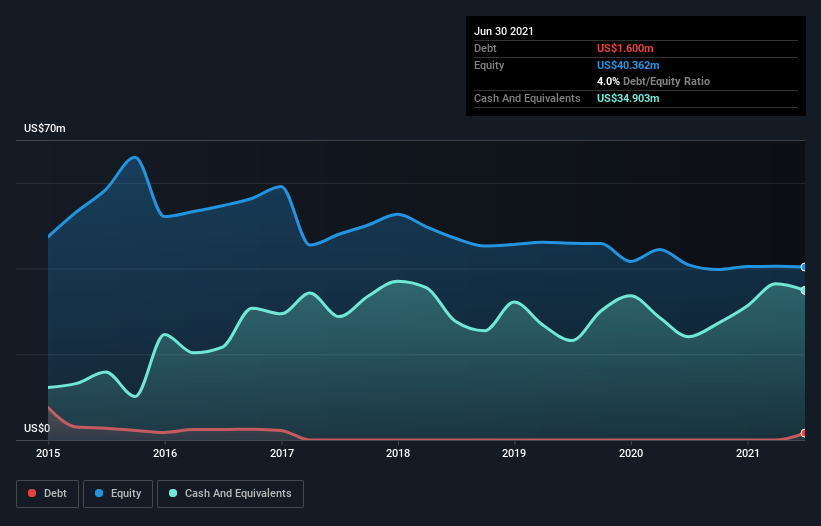- Singapore
- /
- Tech Hardware
- /
- SGX:5AB
Health Check: How Prudently Does Trek 2000 International (SGX:5AB) Use Debt?
David Iben put it well when he said, 'Volatility is not a risk we care about. What we care about is avoiding the permanent loss of capital.' So it seems the smart money knows that debt - which is usually involved in bankruptcies - is a very important factor, when you assess how risky a company is. We note that Trek 2000 International Ltd (SGX:5AB) does have debt on its balance sheet. But is this debt a concern to shareholders?
When Is Debt Dangerous?
Debt assists a business until the business has trouble paying it off, either with new capital or with free cash flow. If things get really bad, the lenders can take control of the business. However, a more common (but still painful) scenario is that it has to raise new equity capital at a low price, thus permanently diluting shareholders. Having said that, the most common situation is where a company manages its debt reasonably well - and to its own advantage. When we examine debt levels, we first consider both cash and debt levels, together.
View our latest analysis for Trek 2000 International
What Is Trek 2000 International's Net Debt?
The image below, which you can click on for greater detail, shows that at June 2021 Trek 2000 International had debt of US$1.60m, up from none in one year. However, it does have US$34.9m in cash offsetting this, leading to net cash of US$33.3m.

How Strong Is Trek 2000 International's Balance Sheet?
According to the last reported balance sheet, Trek 2000 International had liabilities of US$9.37m due within 12 months, and liabilities of US$277.0k due beyond 12 months. On the other hand, it had cash of US$34.9m and US$8.16m worth of receivables due within a year. So it can boast US$33.4m more liquid assets than total liabilities.
This surplus strongly suggests that Trek 2000 International has a rock-solid balance sheet (and the debt is of no concern whatsoever). With this in mind one could posit that its balance sheet means the company is able to handle some adversity. Succinctly put, Trek 2000 International boasts net cash, so it's fair to say it does not have a heavy debt load! There's no doubt that we learn most about debt from the balance sheet. But it is Trek 2000 International's earnings that will influence how the balance sheet holds up in the future. So when considering debt, it's definitely worth looking at the earnings trend. Click here for an interactive snapshot.
In the last year Trek 2000 International wasn't profitable at an EBIT level, but managed to grow its revenue by 30%, to US$36m. Shareholders probably have their fingers crossed that it can grow its way to profits.
So How Risky Is Trek 2000 International?
While Trek 2000 International lost money on an earnings before interest and tax (EBIT) level, it actually booked a paper profit of US$322k. So when you consider it has net cash, along with the statutory profit, the stock probably isn't as risky as it might seem, at least in the short term. Given it also grew revenue by 30% over the last year, we think there's a good chance the company is on track. So this may well be an interesting business to watch grow. There's no doubt that we learn most about debt from the balance sheet. But ultimately, every company can contain risks that exist outside of the balance sheet. These risks can be hard to spot. Every company has them, and we've spotted 3 warning signs for Trek 2000 International you should know about.
If you're interested in investing in businesses that can grow profits without the burden of debt, then check out this free list of growing businesses that have net cash on the balance sheet.
Valuation is complex, but we're here to simplify it.
Discover if Trek 2000 International might be undervalued or overvalued with our detailed analysis, featuring fair value estimates, potential risks, dividends, insider trades, and its financial condition.
Access Free AnalysisHave feedback on this article? Concerned about the content? Get in touch with us directly. Alternatively, email editorial-team (at) simplywallst.com.
This article by Simply Wall St is general in nature. We provide commentary based on historical data and analyst forecasts only using an unbiased methodology and our articles are not intended to be financial advice. It does not constitute a recommendation to buy or sell any stock, and does not take account of your objectives, or your financial situation. We aim to bring you long-term focused analysis driven by fundamental data. Note that our analysis may not factor in the latest price-sensitive company announcements or qualitative material. Simply Wall St has no position in any stocks mentioned.
About SGX:5AB
Trek 2000 International
An investment holding company, provides interactive consumer, wireless, encryption, and enterprise solutions.
Flawless balance sheet with slight risk.
Market Insights
Community Narratives



